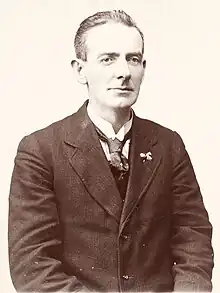Seán Milroy | |
|---|---|
 Milroy, c. 1920s | |
| Teachta Dála | |
| In office May 1921 – 30 October 1924 | |
| Constituency | Both Cavan and Fermanagh and Tyrone |
| Senator | |
| In office April – July 1938 | |
| Constituency | Labour Panel |
| Senator | |
| In office December 1928 – May 1936 | |
| Personal details | |
| Born | John Ignatius Milroy 1877 Cumberland, England |
| Died | 30 November 1946 (aged 68–69) Dublin, Ireland |
| Political party | |
| Military service | |
| Branch/service | Irish Republican Army |
| Unit | Irish Volunteers |
| Battles/wars | Easter Rising |
Seán Milroy (1877 – 30 November 1946) was an Irish revolutionary and politician, who took part in the 1916 Easter Rising and served in the Second Dáil during the War of Independence and afterwards in the Seanad of the Irish Free State.[1]
Biography
Milroy was born in Maryport, Cumberland, England to Scottish parents. He moved to Cork as a young adult.[2] He was a journalist by profession.
He was a close personal friend of Arthur Griffith and an early member of Sinn Féin, serving on its national executive from 1909 to 1912.[1] He joined the Irish Volunteers, and in 1915 he was arrested and imprisoned for three months for a speech in which he urged Irishmen not to fight in World War I.[3] He fought in the Easter Rising in 1916, and was imprisoned in England.[1]
On 3 April 1918, Milroy contested a by-election for Sinn Féin in Tyrone East unsuccessfully. At the 1918 United Kingdom general election he stood in Tyrone North-East, but an electoral pact brokered by Cardinal Michael Logue allocated the seat to the Irish Parliamentary Party and it was not contested by Sinn Féin.[4] He was elected a Sinn Féin Teachta Dála (TD) at the 1921 elections for both the Cavan constituency and for the Fermanagh and Tyrone constituency.[5] He supported the Anglo-Irish Treaty and voted in favour of it.
He became a member of Cumann na nGaedheal but left the party and resigned from his seat on 30 October 1924 along with seven other TDs in opposition to the Government's actions to the so-called Irish Army Mutiny. He contested the June 1927 general election unsuccessfully.[6]
In later years, he made up with his former colleagues and was elected to Seanad Éireann, serving for both Cumann na nGaedheal and later for Fine Gael from 1928 until the Free State Seanad was abolished in 1936. He was re-elected to the new Seanad in 1938, following the 1937 general election but failed to be re-elected following the 1938 general election.
References
- 1 2 3 Coleman, Marie (October 2009). "Milroy, John Ignatius ('Seán')". Dictionary of Irish Biography. Retrieved 10 December 2021.
- ↑ Sean Milroy Kilmainham Gaol Autographbooks
- ↑ Kelly, M. J. (2006). The Fenian Ideal and Irish Nationalism, 1882-1916. Boydell & Brewer. p. 249. ISBN 1843832046. Retrieved 3 April 2016.
- ↑ Dublin Evening Telegraph. 4 December 1918. Milroy defied the pact as a breakaway candidate but received only 56 votes.
- ↑ "Seán Milroy". Oireachtas Members Database. Retrieved 11 April 2009.
- ↑ "Seán Milroy". ElectionsIreland.org. Retrieved 11 April 2009.
Sources
- Todd Andrews (1979), Dublin Made Me.
- Tim Pat Coogan (1995), De Valera: Long Fellow, Long Shadow.
- Memoirs of Senator Joseph Connolly: A Founder of Modern Ireland. J. Anthony Gaughan (ed), 1996.
.pdf.jpg.webp) Colonial office intelligence file for John Milroy
Colonial office intelligence file for John Milroy.pdf.jpg.webp) British Army military intelligence file for John Milroy
British Army military intelligence file for John Milroy